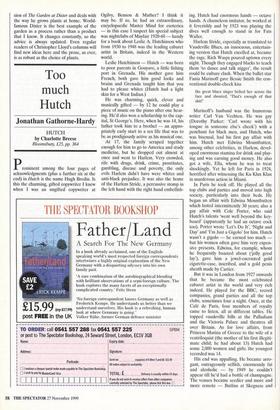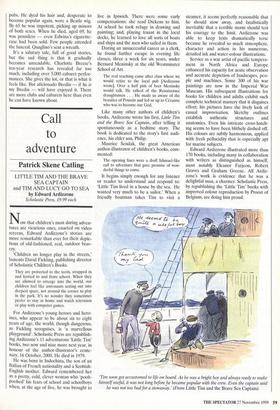Too much Hutch
Jonathan Gathorne-Hardy
HUTCH by Charlotte Breese Bloomsbury, £25, pp. 364
Prominent among the four pages of acknowledgments (plus a further six at the end) in Hutch is the name Hugh Bredin. Is this the charming, gifted copywriter I knew when I was an ungifted copywriter at
Ogilvy, Benson & Mather? I think it may be. If so, he had an extraordinary, encyclopaedic Master Mind for esotcrica — in this case I suspect his special subject was nightclubs of Mayfair 1920-60 — handy for a book about Leslie A. Hutchinson who from 1930 to 1948 was the leading cabaret artist in Britain, indeed in the Western world.
Leslie Hutchinson — Hutch — was born to poor parents in Gouyave, a little fishing port in Grenada. His mother gave him French, both gave him good looks and brains and Grenada taught him that you had to please whites (Hutch had a light skin for a West Indian.) He was charming, quick, clever and musically gifted — by 12 he could play a piece of music on the piano after one hear- ing. He'd also won a scholarship to the cap- ital, St George's. Here, when he was 14, his father took him to a brothel — an appro- priately early start to a sex life that was to be as prodigiously active as his musical one.
At 17, the family scraped together enough for him to go to America and study medicine, but he dropped out almost at once and went to Harlem. Very crowded, rife with drugs, drink, crime, prostitutes, gambling, disease and poverty, the only evils Harlem didn't have were whites and anti-black prejudice. It was also the home of the Harlem Stride, a percussive stomp in the left hand with the right hand embellish-
ing. Hutch had enormous hands — octave hands. A chameleon imitator, he worked at it feverishly and by 1923 was playing the dives well enough to stand in for Fats Waller.
Harlem Stride, especially as translated to Vaudeville Blues, an innocuous, entertain- ing version that Hutch excelled at, became the rage. Rich Wasps poured uptown every night. Though they engaged blacks to teach them 'to dance and talk nigger', the result could be culture clash. When the ballet star Fania Marinoff gave Bessie Smith the con- ventional double-cheek kiss the great blues singer belted her across the face and shouted, 'That's enough of that Marinoff's husband was the humorous writer Carl Van Vechten. He was gay (Dorothy Parker: 'Carl wrote with his tongue in someone else's cheek') with a penchant for black men, and Hutch, who was bisexual, had his first gay affair with him. Hutch met Edwina Mountbatten, among other celebrities, in Harlem, devel- oped enormous stamina for drink and play- ing and was earning good money. He also got a wife, Ella, whom he was to treat shockingly. Yet he left for Paris in 1924, horrified after witnessing the Ku Klux Klan in murderous action in Miami.
In Paris he took off. He played all the top clubs and parties and moved into high society, particularly into their beds. He began an affair with Edwina Mountbatten which lasted intermittently 30 years; also a gay affair with Cole Porter, who said Hutch's talents 'went well beyond the key- board' (apparently he had an octave cock too). Porter wrote 'Let's Do It', 'Night and Day' and 'I'm Just a Gigolo' for him. Hutch wasn't a gigolo — he earned too much — but his women often gave him very expen- sive presents. Edwina, for example, whom he frequently boasted about (jolly good lay'), gave him a jewel-encrusted gold cigarette-case, inscribed, and a gold penis sheath made by Cartier.
But it was in London from 1927 onwards that he became the most celebrated cabaret artist in the world and very rich indeed. He played for the BBC, record companies, grand parties and all the top clubs, sometimes four a night. Once, at the Cafe de Paris, four members of royalty came to listen, all at different tables. He topped vaudeville bills at the Palladium and the Victoria Palace and theatres all over Britain. As for love affairs, from Princess Marina of Greece to the wife of a ventriloquist (the mother of his first illegiti- mate child; he had about 13) Hutch had some 2,000 women and girls; the youngest recorded was 14.
His end was appalling. He became arro- gant, outrageously selfish, enormously fat and alcoholic — by 1949 he couldn't appear till he'd had a bottle of champagne. The venues became seedier and more and more remote — Butlins at Skegness and pubs. He dyed his hair and, desperate to become popular again, wore a Beatle wig. By 65 he was impotent, picking up minors of both sexes. When he died, aged 69, he was penniless — even Edwina's cigarette- case had been sold. Few people attended the funeral. Quaglino's sent a wreath.
It's a salutary tale, full of good stories, but the sad thing is that it gradually becomes unreadable. Charlotte Breese's ten-year research has revealed far too much, including over 5,000 cabaret perfor- mances. She gives the lot, or that is what it feels like. But aficionado Bredin — if he is my Bredin — will have enjoyed it. There are more clubs and cabarets here than even he can have known about.



























































































 Previous page
Previous page